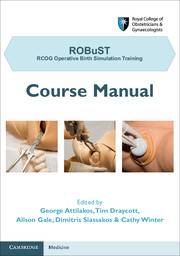Book contents
- Advertisements
- ROBuST
- ROBuST
- Copyright page
- Contents
- Contributors
- Acknowledgements
- Abbreviations
- Preface
- Chapter 1 Operative vaginal birth in the 21st century: a global perspective
- Chapter 2 Indications and assessment for operative vaginal birth
- Chapter 3 Nontechnical skills
- Chapter 4 Vacuum-assisted birth
- Chapter 5 Nonrotational forceps and manual rotation
- Chapter 6 Rotational forceps
- Chapter 7 Caesarean section at full dilatation
- Chapter 8 Medico-legal matters
- Chapter 9 Analgesia and anaesthesia for operative vaginal birth
- Index
Chapter 3 - Nontechnical skills
Published online by Cambridge University Press: 05 June 2014
- Advertisements
- ROBuST
- ROBuST
- Copyright page
- Contents
- Contributors
- Acknowledgements
- Abbreviations
- Preface
- Chapter 1 Operative vaginal birth in the 21st century: a global perspective
- Chapter 2 Indications and assessment for operative vaginal birth
- Chapter 3 Nontechnical skills
- Chapter 4 Vacuum-assisted birth
- Chapter 5 Nonrotational forceps and manual rotation
- Chapter 6 Rotational forceps
- Chapter 7 Caesarean section at full dilatation
- Chapter 8 Medico-legal matters
- Chapter 9 Analgesia and anaesthesia for operative vaginal birth
- Index
Summary
- Type
- Chapter
- Information
- ROBuST: RCOG Operative Birth Simulation TrainingCourse Manual, pp. 31 - 43Publisher: Cambridge University PressPrint publication year: 2013

